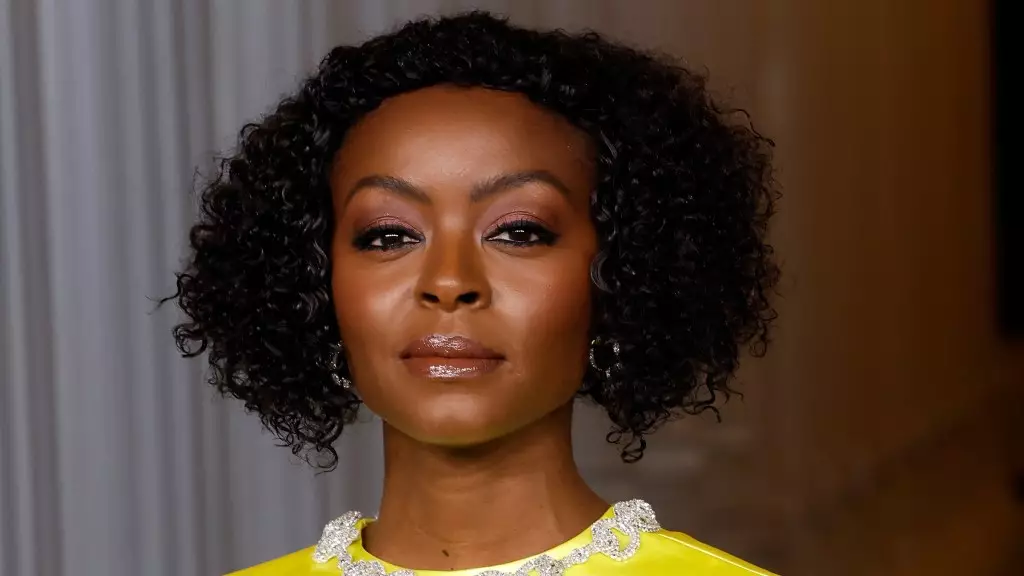In the ever-evolving landscape of Hollywood, recognition can often overshadow the driving forces that make art meaningful. Actress Danielle Deadwyler, known for her compelling performance in *Till*, has found herself navigating the complexities of this recognition culture—especially in light of her recent return to the awards conversation with *The Piano Lesson*. Instead of getting tangled up in the drama of awards season, Deadwyler adopts a more grounded view. She holds that true value lies not in accolades but in the collective experience of storytelling—a refreshing perspective that counters the often narcissistic focus of awards discussions.
Her recent remarks in a profile with the *Los Angeles Times* reflect a transformative realization: “I’m relaxed about it.” By prioritizing cultural connections and the broader impact of her work, Deadwyler highlights a critical gap in discourse surrounding awards. Rather than clinging to the validation that comes with nominations and wins, she suggests that the essence of filmmaking is found in the ensemble efforts—where collaboration becomes the heartbeat of creativity.
Deadwyler’s sense of relaxation amidst the Oscars buzz is rooted in a backdrop of controversy that plagued the 2022 awards season. The conversation surrounding the lack of recognition for Black women filmmakers and actors, particularly Deadwyler, Gina Prince-Bythewood, and Viola Davis, underscores systemic issues within the industry. With a notable nomination for Andrea Riseborough in *To Leslie*, Deadwyler indicated that this unexpected turn illuminated the often discriminatory undertones of award nominations.
Her recognition of “misogynoir” exemplifies how race and gender intersect in Hollywood, revealing a deeper layer of complexity to the awards process. “Controversy always surrounds Blackness,” she states, capturing the pervasive struggle faced by many Black artists. The exclusion from mainstream recognition becomes a reflection of broader societal issues, prompting a necessary discourse on representation and equity within the film industry.
Set to debut on Netflix, *The Piano Lesson*, adapted from August Wilson’s Pulitzer Prize-winning play, offers a poignant exploration of the Black experience and family legacy. Directed by Malcolm Washington, it tells the story of siblings Boy Willie and Berniece, who must confront their painful history embodied in a treasured piano. The film is a part of Wilson’s Century Cycle, which delves into the complexities of Black life across different decades, enhancing cultural understanding and fostering conversations about race, heritage, and identity.
As Deadwyler prepares to step back into the spotlight with this project, the film serves as an appropriate vessel for her vision of community and cultural storytelling. Here, the exploration of familial bonds and the weight of historical significance reverberates with modern audiences, reinforcing the notion that art should be reflective of lived experiences rather than seen solely as a ticket to accolades. The choice to focus on an ensemble narrative allows for a richer tapestry of voices and stories, emphasizing collective struggle over individual triumph.
As awards season circles back with its familiar flurry, Deadwyler remains firm in her belief that external recognition should not overshadow the intrinsic value of art. Her sentiments speak to a growing movement in the industry that advocates for a shift in how success is defined. By prioritizing authentic engagement with culture and people, Deadwyler is not just promoting a more equitable industry; she is championing a more humane approach to storytelling.
The relentless pursuit of awards, she argues, can become an overwhelming force that distorts the essence of creative expression. This perspective invites artists and audiences alike to reevaluate their motivations and appreciate the beauty of collaboration over competition. Through her work and words, Deadwyler encourages a dialogue on the importance of placing cultural significance and shared experiences above fleeting accolades.
Danielle Deadwyler’s insights into recognition in the film industry extend beyond her personal narrative; they represent a call for a more profound shift in how stories are told and understood. As she steps into the spotlight with *The Piano Lesson*, her relaxed stance amid the discussions about awards resonates with a broader audience yearning for authenticity. By advocating for an industry that values connection and cultural representation, Deadwyler not only redefines success but also challenges the norms that dictate it, paving the way for a more inclusive and equitable future in filmmaking.


Leave a Reply